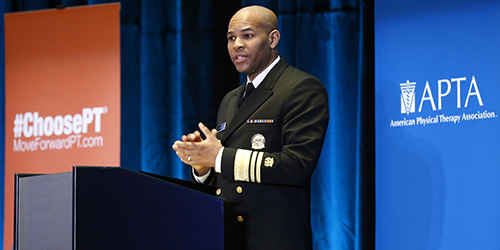If you think the physical therapy profession has an important role to play in improving public health on multiple fronts, you won't get any arguments from US Surgeon General Jerome Adams, MD, MPH. In fact, you might get the rhetorical equivalent of a high-five.
In an address that repeatedly cited the APTA's community-building mission, Adams told his audience of association leaders that the profession is "well-positioned to change the culture around pain management" in the United States and that "we know that physical therapy is going to be a part of" the evolution toward value-based care. The remarks were delivered as part of the APTA Component Leadership Meeting, an event that preceded the 2019 APTA Combined Sections meeting being held in Washington, DC, January 23-26.
Adams focused on the opioid crisis and the physical therapy profession's role in addressing it, with an emphasis on the importance of involving and educating communities on nonopioid alternatives to pain management, and compassionate care and treatment of individuals with addictions. It's a concept Adams is extending to public health in general through what he calls "better health through better partnerships."

Surgeon General of the United States Jerome Adams, MD, MPH, addressed a meeting of APTA component leaders.
"We can't operate in silos" to address public health challenges such as the opioid crisis, Adams said. "We need partnerships and we need collaborations. We need to bring people and organizations together that we may never worked with, never thought of before."
The fact that APTA's new mission statement is rooted in the idea of building a community to improve the health of society wasn't lost on Adams, who cited both the association's mission and its #BetterTogether hashtag as a reflection of the values he believes are key to positive change.
"APTA is a public health leader within communities," Adams said, and among the "game changers and disruptors" that will be necessary players in turning the tide on opioid abuse.
Adams acknowledged that the country's health care system contributed to the rise of opioids and in many ways was not prepared for the crisis it now faces. In fact, he explained, the issue wasn't on the radar of most public health experts—but attitudes quickly changed. Paraphrasing boxer Mike Tyson, Adams told the audience that "Everyone's got a plan until they get punched in the mouth."
"The opioid crisis is our punch in the mouth," he said.
Adams has a firsthand understanding of the devastating consequences of addiction. He told the audience that is brother is currently in prison, serving out a sentence for theft committed to support his opioid addiction.
"Addiction can happen to anyone," he said. "Even the brother of the United States Surgeon General."
And while the opioid crisis has ravaged families and communities, "out of this tragedy there is tremendous opportunity," Adams said. That opportunity is rooted in making connections both across health care disciplines and throughout communities. He urged APTA members to become well-educated on opioid addiction and its treatment—including learning how to carry and administer the anti-overdose drug Naloxone—and to help promote nonopioid pain management through initiatives such as APTA's own #ChoosePT campaign and the Office of the Surgeon General's resources on opioid addiction and prevention.
"It's an indisputable fact that physical therapists are well-positioned to change the culture around pain management," Adams said.
He also believes the physical therapy profession is a leader that "should be at the table" for a wide range of health policy discussions—particularly when those discussions center on the evolution away from fee-for-service models and toward value-based care. The reason, he said, is simple: "We know that physical therapy is going to be a part of every one of those value-based practices."
The bottom line for health care should be "stop paying for things that don't work and start paying for things that do work," including physical therapy, Adams added.
In a brief Q-and-A session with APTA CEO Justin Moore, PT, DPT, after his remarks, Adams extended his community education philosophy to the challenge of changing the country's exercise habits. The problem for health care providers is that "we tend to talk in ways that make sense to us but don't resonate with other folks," Adams said. Instead, the exercise message needs to be built around the concept that regular physical activity can improve economic and social opportunities—better jobs, more time spent with family, and more prosperous communities.
And if by the end of his address, anyone in the audience was still unsure of the surgeon general's attitude about the physical therapy profession, a follow-up APTA video interview left little room for doubt as to where Adams stands.
"Physical therapists are key to overcoming not only the opioid epidemic but in creating healthier societies," Adams said. "Know that you have no bigger fan than the United States surgeon general."